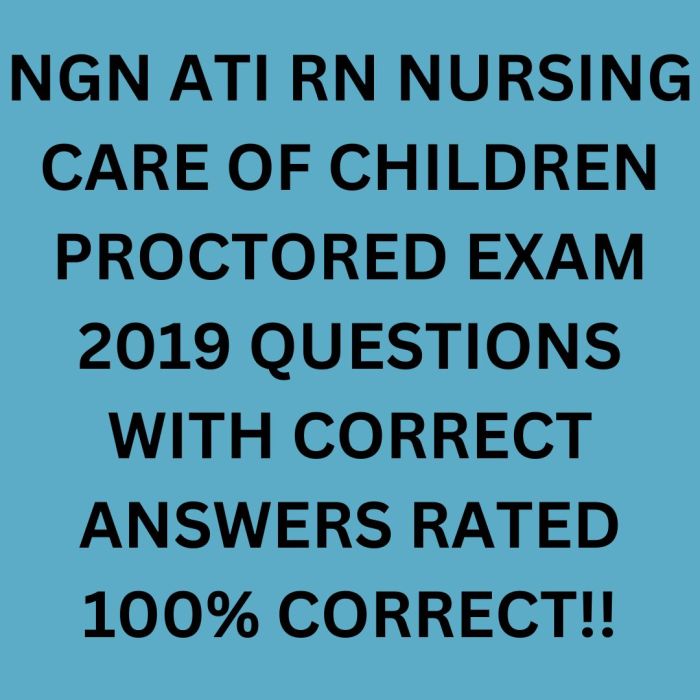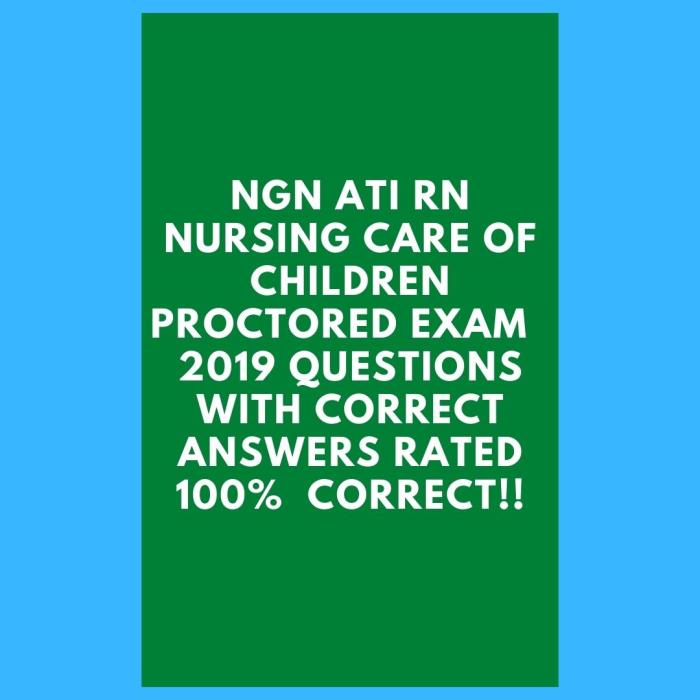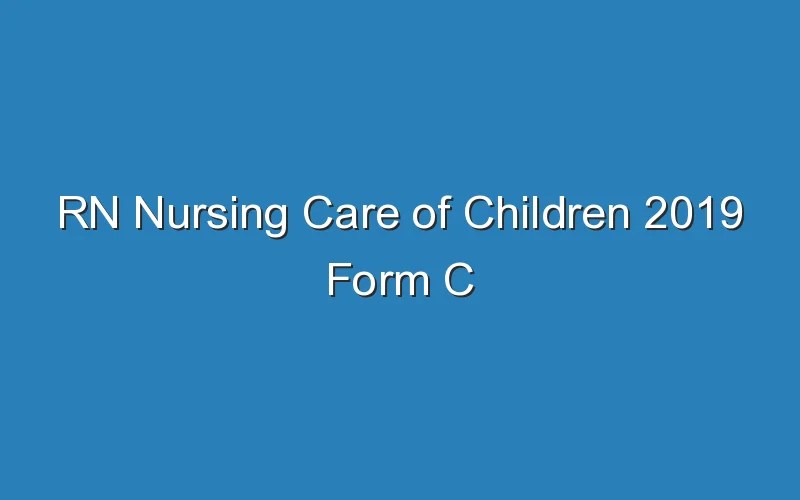RN nursing care of children 2019 with NGN proctored has emerged as a transformative approach in pediatric healthcare, offering a comprehensive and innovative framework for delivering high-quality care to young patients. This comprehensive guide explores the scope, benefits, ethical considerations, and future directions of NGN proctored care, providing a valuable resource for nurses and healthcare professionals dedicated to advancing the well-being of children.
With its emphasis on collaboration, technology, and evidence-based practices, RN nursing care of children 2019 with NGN proctored represents a paradigm shift in pediatric nursing, empowering nurses to provide exceptional care in a rapidly evolving healthcare landscape.
1. RN Nursing Care of Children 2019 with NGN Proctored

RNs play a crucial role in providing care to children in various settings, including NGN proctored care. NGN proctored care involves the use of technology to connect patients with healthcare providers remotely, enabling children to receive care from the comfort of their own homes.
In 2019, the scope of practice for RNs caring for children with NGN proctored care has expanded significantly. RNs are now responsible for:
- Assessing and monitoring children’s health status
- Providing health education and counseling to children and their families
- Administering medications and treatments
- Collaborating with other healthcare professionals to provide comprehensive care
To provide NGN proctored care effectively, RNs require specific skills and knowledge, including:
- Proficiency in using NGN technology
- Strong communication and interpersonal skills
- Knowledge of child development and health assessment
- Ability to work independently and as part of a team
Examples of NGN proctored care interventions that RNs can perform include:
- Conducting virtual health assessments
- Providing medication management and education
- Monitoring children’s vital signs and symptoms
- Educating families on health and safety practices
2. Benefits of NGN Proctored Care for Children: Rn Nursing Care Of Children 2019 With Ngn Proctored
NGN proctored care offers numerous benefits for children, including:
- Improved access to care: NGN proctored care eliminates geographical barriers, allowing children in remote or underserved areas to access healthcare services.
- Reduced costs: NGN proctored care can be more cost-effective than traditional in-person care, as it reduces the need for transportation and time off work for families.
- Increased patient satisfaction: NGN proctored care provides children with the convenience and comfort of receiving care from home, leading to higher patient satisfaction.
Case studies and research have demonstrated the positive impact of NGN proctored care on children’s health outcomes. For example, a study published in the Journal of Telemedicine and Telecare found that children receiving NGN proctored care for asthma had improved symptom control and reduced hospitalizations.
However, NGN proctored care also has potential challenges and limitations. These include:
- Technology limitations: NGN proctored care requires reliable internet access, which may not be available in all areas.
- Technical difficulties: RNs and families may experience technical difficulties during NGN proctored care sessions, which can disrupt care delivery.
- Limited physical examination: NGN proctored care does not allow for a complete physical examination, which may be necessary for certain conditions.
3. Ethical Considerations in NGN Proctored Care for Children

NGN proctored care raises several ethical considerations, including:
- Privacy: NGN proctored care involves the collection and transmission of sensitive health information, which raises concerns about privacy and confidentiality.
- Confidentiality: Healthcare providers must ensure that children’s health information is kept confidential and not shared without their consent.
- Informed consent: Children and their families must be fully informed about the benefits and risks of NGN proctored care before consenting to treatment.
RNs play a vital role in ensuring that ethical principles are upheld in NGN proctored care. They must:
- Obtain informed consent from children and their families
- Protect children’s privacy and confidentiality
- Advocate for children’s best interests
Strategies for addressing ethical concerns and promoting patient safety in NGN proctored care settings include:
- Developing clear policies and procedures for NGN proctored care
- Providing training to RNs on ethical issues related to NGN proctored care
- Establishing mechanisms for reporting and addressing ethical concerns
4. Future Directions for NGN Proctored Care for Children

NGN proctored care is a rapidly evolving field, with advancements in technology and new care models shaping its future. Potential future directions for NGN proctored care for children include:
- Integration of artificial intelligence (AI): AI can be used to enhance NGN proctored care by providing real-time analysis of patient data and supporting decision-making.
- Development of virtual reality (VR) and augmented reality (AR) technologies: VR and AR can be used to create immersive and interactive experiences for children receiving NGN proctored care.
- Expansion of NGN proctored care to new settings: NGN proctored care can be expanded to reach children in schools, community centers, and other non-traditional healthcare settings.
Research and innovation will continue to play a critical role in shaping the future of NGN proctored care for children. By exploring new technologies and developing innovative care models, RNs can improve the accessibility, quality, and effectiveness of healthcare services for children.
NGN proctored care has significant implications for the nursing profession and the healthcare system as a whole. As NGN proctored care becomes more widely adopted, RNs will need to adapt their skills and knowledge to meet the changing needs of children and their families.
FAQ Summary
What is the scope of practice for RNs caring for children in 2019 with NGN proctored care?
RNs providing NGN proctored care to children in 2019 have an expanded scope of practice that includes assessing, diagnosing, and managing common childhood illnesses and injuries, administering medications, providing health education, and coordinating care with other healthcare providers.
What are the benefits of NGN proctored care for children?
NGN proctored care offers numerous benefits for children, including improved access to care, reduced costs, increased patient satisfaction, and better health outcomes.
What are the ethical considerations related to NGN proctored care for children?
Ethical considerations in NGN proctored care for children include privacy, confidentiality, informed consent, and ensuring the well-being of the child.